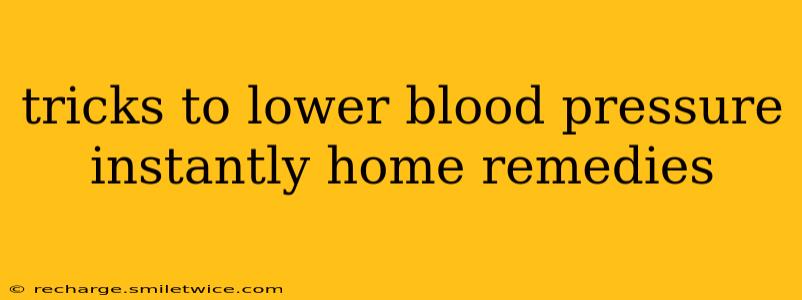High blood pressure, or hypertension, is a serious health concern affecting millions worldwide. While medication is often necessary for long-term management, there are several home remedies that can help lower your blood pressure instantly, offering immediate relief and contributing to overall blood pressure management. It's crucial to remember that these are supplemental to, not replacements for, medical advice and prescribed treatments. Always consult your doctor before making significant changes to your healthcare regimen.
What Causes a Sudden Spike in Blood Pressure?
Understanding the triggers for sudden blood pressure increases is the first step towards effective management. Several factors can contribute to a temporary elevation:
- Stress: Anxiety, anger, or intense emotional situations can significantly raise blood pressure.
- Caffeine and Alcohol: These substances are known stimulants that can temporarily increase blood pressure.
- Lack of Sleep: Sleep deprivation can disrupt your body's natural rhythm, leading to higher blood pressure.
- Dehydration: Insufficient fluid intake can thicken your blood, increasing pressure on your arteries.
- Certain Foods: High-sodium meals or those rich in saturated fats can cause a temporary spike.
Quick Home Remedies to Lower Blood Pressure
These techniques can help lower your blood pressure relatively quickly, providing temporary relief:
1. Deep Breathing Exercises
Deep, slow breathing activates the parasympathetic nervous system, counteracting the effects of stress hormones that raise blood pressure. Practice diaphragmatic breathing (belly breathing) for 5-10 minutes to calm your nervous system and lower your blood pressure.
2. Hydration
Drinking a glass of water can help increase blood volume, thereby diluting the blood and reducing pressure on artery walls. Dehydration is a common cause of temporary blood pressure increases.
3. Reduce Caffeine and Alcohol Intake
If you experience a sudden blood pressure increase, avoid caffeine and alcohol. These substances are potent stimulants that can quickly raise your blood pressure. Moderation is key in long-term blood pressure management.
4. Mindfulness and Relaxation Techniques
Practicing mindfulness, meditation, or yoga can help reduce stress and lower blood pressure. Even a few minutes of focused relaxation can have a noticeable impact.
5. Lower Your Sodium Intake
If you've recently consumed a high-sodium meal, try to increase your water intake to help flush out excess sodium. While this won't instantly lower your pressure significantly, it helps in the long run.
6. Potassium-Rich Foods
Potassium helps balance sodium levels in the body, contributing to healthier blood pressure. Foods rich in potassium, such as bananas, spinach, and sweet potatoes, can be beneficial in the long-term management of blood pressure. (Note: this won't provide instant relief).
Long-Term Strategies for Blood Pressure Management
While these quick remedies offer immediate relief, lasting blood pressure control requires a more holistic approach:
1. Regular Exercise
Regular physical activity strengthens your heart and improves blood vessel function, leading to lower blood pressure over time. Aim for at least 150 minutes of moderate-intensity aerobic exercise per week.
2. Healthy Diet
A diet rich in fruits, vegetables, whole grains, and lean protein, while low in sodium and saturated fats, is crucial for long-term blood pressure management. The DASH (Dietary Approaches to Stop Hypertension) diet is a well-regarded plan.
3. Stress Management Techniques
Chronic stress significantly contributes to high blood pressure. Incorporating stress-reduction techniques like yoga, meditation, or deep breathing into your daily routine is essential.
4. Adequate Sleep
Aim for 7-8 hours of quality sleep each night. Sleep deprivation can disrupt your body's hormonal balance, leading to higher blood pressure.
When to Seek Immediate Medical Attention
While home remedies can provide temporary relief, it's crucial to seek immediate medical attention if you experience:
- Severely elevated blood pressure readings.
- Symptoms such as severe headache, chest pain, shortness of breath, or vision changes.
- Sudden onset of dizziness or confusion.
High blood pressure is a serious condition requiring ongoing management. These home remedies can be helpful in managing temporary spikes, but a comprehensive approach involving regular check-ups, medication (if prescribed), and lifestyle changes is essential for long-term health and well-being. Always consult your doctor for personalized advice and treatment plans.
